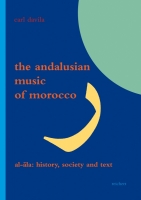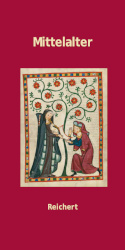Titelsuche
The Andalusian Music of Morocco
Al-Ala: History, Society and Text
2013
17,0 x 24,0 cm, 368 S., 11 Diagramme, 12 s/w Abb., mit Audio-CD, Gebunden
ISBN: 9783895009136
17,0 x 24,0 cm, 368 S., 11 Diagramme, 12 s/w Abb., mit Audio-CD, Gebunden
89,00 €
ISBN: 9783895009136
Kurze Beschreibung
This book reframes the history of the Andalusian music of Morocco by highlighting the interplay of oral and literary processes in the preservation and transmission of this poetic-musical tradition across generations. Although oral communication and the social intimacy it fosters have been highly valued by participants in the tradition throughout its evolution from the elite music of Islamic Spain to its present status as Morocco’s national classical music, over the past two and a half centuries, written anthologies also have evolved as iconic representations of the tradition that function alongside the oral processes without replacing them. Davila brings a new approach to studies of the social foundations of Arabic poetic traditions by proposing a “value theory of tradition” and arguing that this “mixed orality” within the boundaries of the tradition persists because the two embody distinct but complementary sets of values.Ausführliche Beschreibung
In this book, Carl Davila has reshaped the historical narrative concerning al-Ala, the Andalusian music of Morocco, highlighting this poetic-musical tradition’s social foundations and the interplay of oral and literary processes in its preservation and transmission across generations. Part 1 reveals the role played by informal and formal institutions in the tradition’s development, from its earliest phase as the elite courtly music of Islamic Spain, through a middle period when the tradition served as a marker of social identity amongst Andalusi migrant communities in North Africa, and into the modern era when it has achieved a much wider audience as Morocco’s national classical music. Although oral communication and the social intimacy it fosters have been highly valued by participants in the tradition throughout this evolution, over the past two and a half centuries, written anthologies also have evolved as iconic representations of the tradition that function alongside the oral processes without replacing them. Part 2 develops a “value theory of tradition” to explain this survival of oral and literary processes side-by-side within the boundaries of the tradition (a phenomenon he describes as “mixed orality”). Davila argues that they coexist because they embody distinct but complementary sets of social values. In emphasising the different social values attaching to oral and literary processes, this book brings a new approach to Andalusian music studies, and more generally makes important contributions to studies of the social foundations of Arabic poetic traditions. It is directed primarily at scholars of the North African Andalusian music traditions, and to scholars and students of classical Arabic poetry, but anthropologists and ethnomusicologists focused on North Africa will also find interesting insights, as well.Rezensionen
„Sein Werk ist eine gründliche Einführung, in dem musikalische, poetische und traditionelle Aspekte berücksichtigt werden. In Teil 1 behandelt der Autor die Geschichte der andalusischen Musik von ihren spanischen Wurzeln bis zur heutigen Zeit. In Teil 2 liefert er eine Theorie, nach der mündlich übermittelte und literarische Texte nebeneinander bestehen und verschiedene gesellschaftliche Funktionen haben. Im Anhang werden arabische Begriffe erklärt, die mit der andalusischen Musik zusammenhängen. Auf der CD befinden sich zwei Aufnahmen von Musikensembles aus Fez aus den Jahren 2001 und 2012.“Von Liesel Schulze-Meyer
(In: Deutsch-Maghrebinischen Gesellschaft. Medienspiegel November 2013, S. 34.)
Reihentext
Diese Reihe stellt innovative Arbeiten zu den nahöstlichen Literaturen in ihren verschiedenen Epochen und Gattungen vor. Sie versteht sich nicht ausschließlich als ein Forum für Orientwissenschaftler, sondern möchte auch Komparatisten, Literaturwissenschaftlern und einer interessierten Öffentlichkeit Einblicke in das breite Spektrum gegenwärtig produzierter und rezipierter Literatur des Nahen Ostens bieten.
Denn die Herausgeberinnen, Autorinnen und Autoren wollen den Titel der Reihe programmatisch verstanden wissen. Sie gehen von einem Begriff der Weltliteratur aus, der die orientalischen Literaturen nicht nur statisch einbegreift, sondern sie in ein Kulturregionen und Nationalsprachen übergreifendes Spannungsfeld stellt, dessen Dynamik erst im interdisziplinären Austausch erfasst werden kann. Sie gehen ferner davon aus, dass Literaturen in vielfacher Weise intertextuell geprägt sind, dass sie Lektüren verschiedenster vorausgehender Texte darstellen und daher erst in ihrem „lokalen historischen Kontext“ ihren Reiz als Ausdruck einer regional geprägten Ästhetik entfalten können. Die Reihe versucht so, einer neuen Sensibilität für mythische, archetypische, aber auch historische Subtexte in der nahöstlichen Literatur Bahn zu brechen, sie aber gleichzeitig als wichtigen Ausdruck einer globalen kulturellen Mobilität sichtbar zu machen.




 Vorwort
Vorwort

 Neuerscheinungen 2023/2024
Neuerscheinungen 2023/2024
 Gesamtverzeichnis 2023/2024
Gesamtverzeichnis 2023/2024
 Katalog Oriental Studies & Linguistics
Katalog Oriental Studies & Linguistics
 Mittelalter
Mittelalter
 Deutsche Inschriften
Deutsche Inschriften
 Musiktherapie
Musiktherapie
 Literaturen im Kontext
Literaturen im Kontext